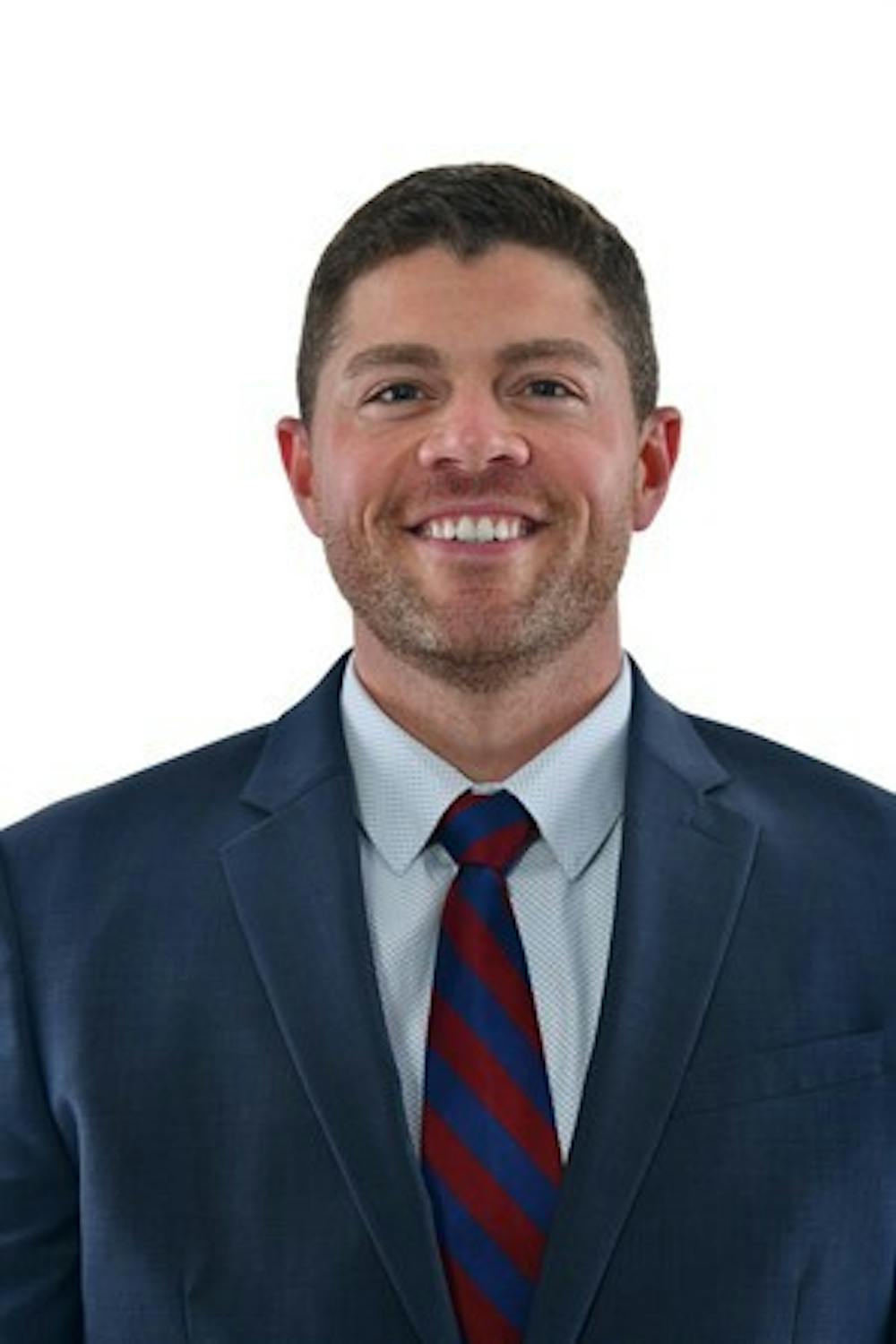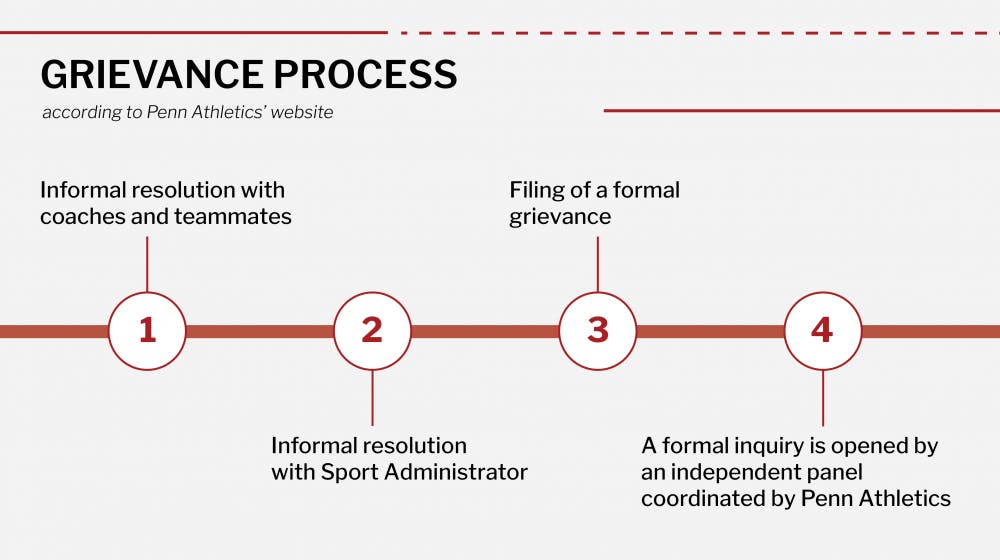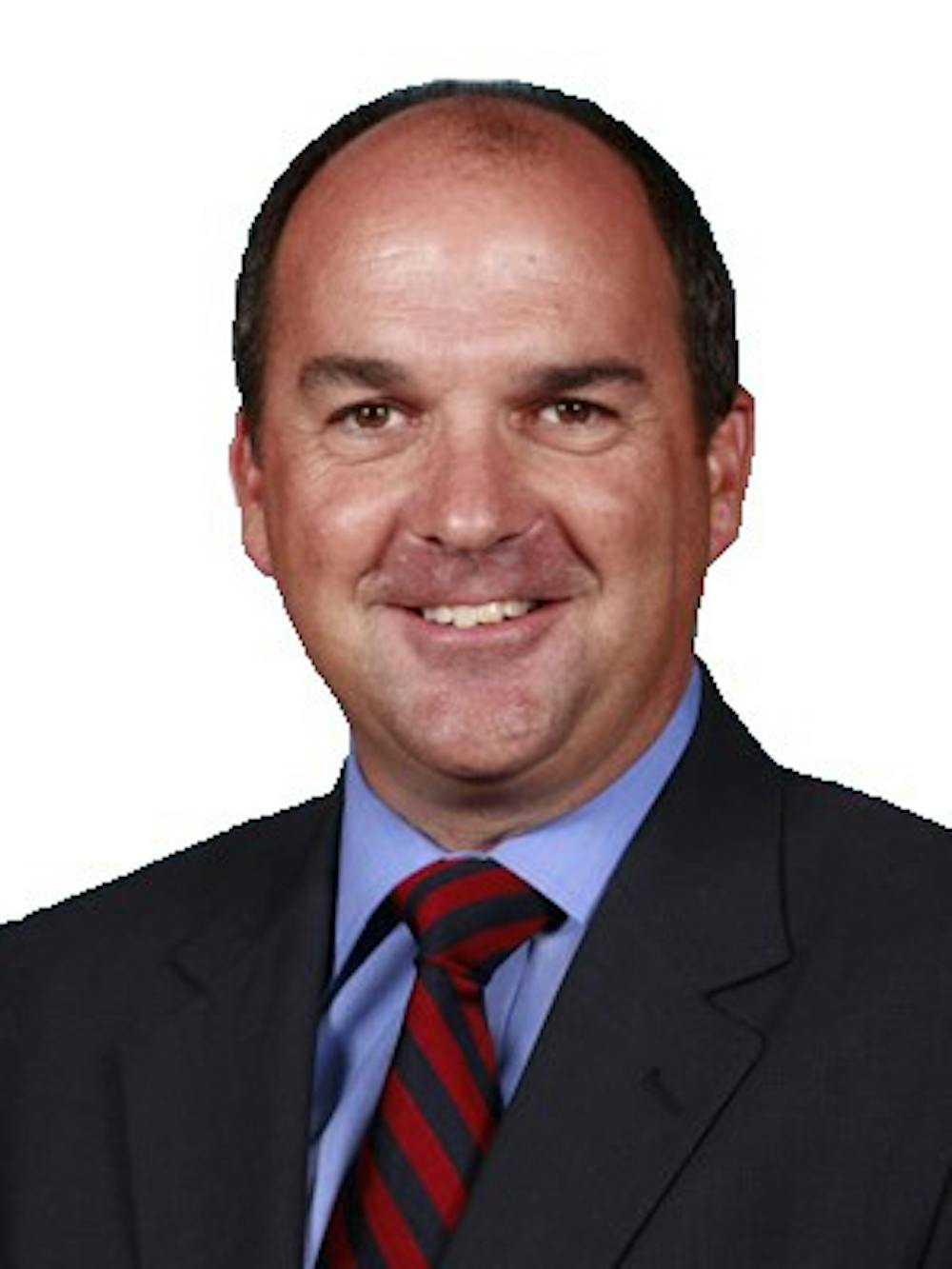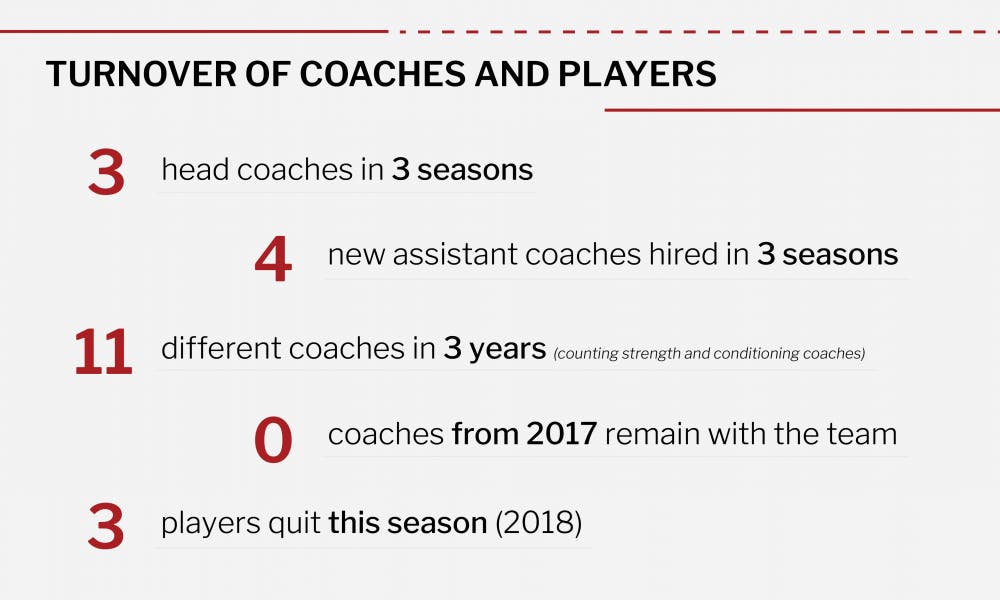Caroline Furrer had led the team through a tumultuous year, dealing with what she sees as a problematic new coach and a negligent administration. On the court, she was one of the team’s stars during one of the worst seasons in program history. Off the court, she was one of the team’s fiercest advocates in its fight to be heard and taken seriously.
Furrer told her teammates on April 1 that she was leaving the volleyball program after three years. The captain’s deliberations were complex and calculated, but her reason was simple: There was no hope.
Her departure was merely the most recent development in a year’s worth of twists and turns that began last spring and continues today.
Several players said that coach Iain Braddak’s conduct over the past year left many on the team feeling offended, mistreated, or dejected, but that Penn Athletics’ responses to the student-athletes’ concerns have left them feeling even worse. From the administration’s decision to hire Braddak, which the team advised strongly against, to its handling of the eight formal grievances filed against him since, multiple players on the team have alleged that they have suffered at the hands of a leadership that has consistently put them second.
“I had to take a stand for what I believe in,” Furrer told The Daily Pennsylvanian after her resignation. “So, I didn't quit the team, I quit Penn Athletics and the coaching staff because of a lack of action and support. When eight out of 20 young women file grievances against a coach, there should be action and support — we got neither.”
Furrer’s teammates say they’re proud of her decision, highlighting the precarious situation they’ve endured for the past year of balancing support for teammates with issues with their coach. Three players have quit. The remaining teammates are left to prepare for another season of playing the sport they love under conditions they don’t.

At multiple points since the beginning of the school year, players have hoped for positive change from both Braddak and Penn Athletics, only to be disappointed with what they saw. Over the course of the last six months, roughly a third of the team — including two of the team’s three captains — have spoken with the DP about their predicament. Multiple sources requested to speak off the record or anonymously, citing either skepticism that voicing their stories would bring about any real change or fear of potential retribution if they did speak out publicly.
Yet, behind closed doors, the team has been fighting hard to be heard by the administration and see their grievances, formal and informal, addressed earnestly.
What follows is a detailed account of the mistreatment that members of Penn volleyball say they have endured. Since Braddak was hired as the team’s third coach in three years, the players feel they have been mistreated at every step. The net result, though still unfolding, has been a team-wide decline in mental health, the departure of a captain and two other teammates, the worst record in program history, and a fundamental change in the way they view the sport they love.
▪ ▪ ▪
The First Season
During the first season of Braddak’s tenure, Penn volleyball lost more games than it had in any season in its 45-year history. Part of the team’s dissatisfaction stemmed from a lack of faith in Braddak’s coaching abilities, but a series of incidents involving his conduct struck various players as inappropriate and offensive — more damaging than the team’s defeats.

Junior Caroline Raquel
“We got about halfway through the season, and nobody was really talking about [Braddak’s conduct] because we didn’t want to be negative … but as girls started talking, we actually realized that it was a lot worse than we expected,” junior Caroline Raquel said.
As the team prepared to begin its Ivy League schedule in late September, one senior was struggling to regain her starting position in the team — which she had held for three years — after missing most of preseason recovering from a concussion. After a month of practicing with the reserves, she met with Braddak to discuss areas in which she could improve in order to earn more time on the court.
Instead of giving constructive feedback or an explanation for her lack of playing time, multiple sources confirmed that Braddak told her not to worry. He said her situation could be worse: She could be addicted to heroin or commit suicide, like players Braddak said he knew of.
It was not long before another controversial comment from Braddak added to the team’s uneasiness.

Coach Iain Braddak
While doing defensive drills in practice, one player was singled out for missing two balls, each passing in between her hands, which were positioned too low. According to multiple players, Braddak subsequently instructed his assistant coach Julia Malseed to hit the player in the face with the next ball in order to teach her to keep her hands higher.
As the season neared its conclusion — something that couldn’t come soon enough for some players — one final event disrupted the mood of the team.
All of the members of the team had recently received brand new Penn volleyball-branded winter coats, but junior Carlie Bolling’s was misplaced. According to multiple sources, Braddak called a team-wide meeting and accused players on the team of stealing the jacket in an act of bullying. Braddak later accused the captains in a private meeting of covering for whoever was responsible. The following weekend, he asked all players traveling on a team trip to hand over their jackets so that the coaching staff could check all of them and account for the missing one.
The jacket was later found in a locker adjacent to Bolling’s in an apparent mixup.
Players reported that the spectacle, referred to in jest by some as “Jacketgate,” served as a massive distraction from practice that week, their games that weekend, and volleyball itself. They noted how it served as a further unneeded blow to the team’s culture at the end of what many described as a miserable season.
Just a couple of weeks later, Braddak announced that Bolling would be leaving the team.
The DP reached out to Braddak through Penn Athletics, which declined to make him available for comment. Bolling did not respond to multiple requests for comment.
If any of these incidents had occured in isolation, they might not have been received so poorly, but players had come to feel uncomfortable around their coach. The team’s skepticism towards Braddak’s coaching methods in addition to his controversial conduct undermined their ability to play for him.
According to several players, these events took a significant toll on the team’s mental health. Many of them reported experiencing their first-ever mental health issues.

“I have never seen more members of a team go to [Counseling and Psychological Services] in all my years at Penn,” one senior player said in November.
Braddak’s conduct led some players to reconsider their commitment to the team.
“Everyone had seriously considered quitting the sport they dedicated their whole lives to,” freshman Carmina Raquel added.
A year filled with losses on the court was an emotionally testing process that was only exacerbated by the administration’s failure to support the players. For many, the team’s underwhelming performance became secondary to the players’ growing concern for their own health.
“We’re not talking about winning and losing, we’re talking about my team’s emotional well-being and the lack of help that I’m having from the administration,” Furrer said.
One senior said that the team’s dynamic by the end of the season was not focused on volleyball at all; instead, she said it became a question of who Braddak was going to offend on a given day.
▪ ▪ ▪
Grievances
At the conclusion of volleyball’s worst season in program history, eight players filed formal grievances with Penn Athletics against Braddak for his conduct during the season. The stories above constituted three of the eight grievances.
While the exact protocol followed by the administration to address the grievances is not public — by design, they’ve declared it a “confidential” process — the most concrete result to come of the administration’s response was a team-wide mediation session called restorative justice. During restorative justice, a third-party firm administered a three-hour meeting attended by all 20 players on the team, Braddak, and Associate Athletic Director Matt Valenti. Some players also reportedly had one-on-one meetings with the mediators before the group session.

At this session, which took place in February, the student-athletes finally aired all their grievances with Braddak in front of each other and in front of him. The move was unprecedented, as this was the first test for the new Penn Athletics grievance protocol instituted last academic year.
“Restorative justice really made it clear that it was very much not okay how many people were struggling with mental health stuff,” Carmina Raquel said.
At this meeting, multiple players said the extent of the damage one coach had caused for the team became apparent when listening to their teammates. As each player got her turn to speak about her experiences, Braddak and Valenti sat and listened, until each of them ultimately got a turn to speak his mind briefly before the meeting’s conclusion.

“We had no idea what we were getting into, what the plan really was, besides this three-hour meeting,” Furrer said. She, among several others, said that the mood on the team after restorative justice was akin to a deep grief or mourning. “We couldn’t even get any work done that night because it was so emotionally traumatizing,” she added.
After everyone had spoken their mind at the meeting, the hired mediators adjourned the session and wished the student-athletes well in finding a resolution with Braddak moving forward. There was no follow-up session, nor has there been any kind of follow-up communication from Penn Athletics regarding next steps since February, according to multiple players.
According to multiple players, practice for the next week was canceled to allow the team time to recover emotionally before returning to practice under Braddak.
“We were all just sent off with no plan to follow up and no plan for further action. In this meeting, some people practically admitted how they were on the verge of self-harm because of that season, and we were just simply dismissed,” Carmina Raquel wrote in a journal entry soon after restorative justice. “Where is the athletic administration in all this?”

Senior Associate Athletic Director Rudy Fuller
In response to the roughly 30 questions and requests for comment asked of Braddak and the two administrators in charge of the team, Valenti and Senior Associate Athletic Director Rudy Fuller, Penn Athletics issued a single, three-paragraph statement attributed solely to Fuller.
“Each grievance was thoroughly vetted and reviewed by the internal Penn Athletics Grievance Committee as well as the external, independent Student-Athlete Grievance Review Committee consisting of campus partners from the University faculty, the Division of Human Resources, and VPUL,” Fuller wrote in the statement.
Caroline Raquel, now just one of two captains after Furrer’s departure, has been unsuccessfully seeking a meeting with Penn Athletics Director M. Grace Calhoun since restorative justice. Despite exchanging multiple emails with Calhoun’s scheduler and Fuller, she has been unable to secure a time slot on Calhoun’s calendar.
“I want to look her in the eyes and tell her from a player’s perspective how devastating it was,” she said.
▪ ▪ ▪
A New Season
In the last week of January, the team — minus the retired senior class — reported for spring training under Braddak. During their brief spring season, the players experienced a much more tightly controlled environment. In accordance with NCAA off-season regulations, the team only practiced with Braddak for two, four, and then six hours per week as opposed to the 30-plus hours a week they saw him in-season in the fall.

Practices with Braddak were often monitored by administrators Valenti and Fuller, who appeared to be exercising some kind of supervision, though players say they were not informed of any official reason for their presence. Multiple players also said both administrators were on their phones the majority of the time, paying little attention to what was happening on the court.
In the aftermath of the restorative justice process, many players have decided to put their heads down and get to work with a new season. Several other players either declined to speak on the record for this story or further requested this story not run altogether, in an apparent acknowledgement that Braddak will not be going anywhere and they will have to continue working together going forward.
“It’s harder for some people, including myself, to be super open and ready to embrace him and this new season,” Carmina Raquel said, adding that none of her teammates expect him to be replaced any time soon. “Some are more fresh start, completely new slate, but I think in general, we’re all just cautious of what he’s doing and how he might be affecting the success of our team.”
“Coach Braddak has done everything asked of him during this process and is fully engaged in working through the issues brought forward through the grievance process,” Fuller wrote in the administration’s single statement to the DP on this story.
“We look forward to working with the coaches and student-athletes in the weeks and months ahead to provide a more positive experience moving forward.”

Some players on the team are hopeful Braddak could improve, while others have lost hope entirely. They all say, however, that they are united on one front: Penn administration could do better.
“As an incoming senior, to feel that [Penn Athletics] still doesn’t really care or isn’t really thinking about what is best for us is the hurtful part,” Caroline Raquel said. “The administration has no relationship with us, they haven’t apologized at all, and they haven’t really done anything to mend that relationship with us.”
It’s difficult to measure the extent of the damage this experience has had on the team, but some players suggest one measure: According to multiple players’ estimates, over 75% of the team reported experiencing issues related to their mental health. Many of them reported using Penn's CAPS for the first time, and according to Furrer, the team now meets with a counselor from CAPS scheduled through Penn Athletics.

Another measure: Furrer, one of the team’s three captains, its best server, and its star defender, left the program after deciding she could endure no longer, making her the third player to quit since the start of the school year.
“We realized along the way that it shouldn’t be like this,” Furrer said. “A student-athlete’s experience should not be mentally abusive and emotionally manipulative, and that’s what it was for a lot of us.”
Throughout the past year, the administration has maintained that it is emphasizing student-athlete wellness and a positive experience in a broad sense. Braddak, the coach who was touted for his holistic approach to student-athlete development upon his hiring, claimed the same during interviews with the DP for other stories throughout the fall season.

Yet many on the team maintain that this is precisely the area where they have been let down the most.
“As a freshman only barely having finished one semester here, I know I don’t have the most traditionally ‘wise’ perspective of college athletics,” Carmina Raquel wrote soon after her team’s restorative justice session. “But I can confidently and wholeheartedly say that Penn volleyball’s 2018 season was not it."
“I can literally see the pieces of our team and of our program on the floor of Penn Athletics’ administration office,” Raquel later continued. “No one knows how to pick the pieces back up. No one wants to. No one wants to put in the effort to restart the game. But what are we supposed to do?"
“We are kicking, screaming, and crying out from rock bottom for help — for action. And no one is listening.”
The Daily Pennsylvanian is an independent, student-run newspaper. Please consider making a donation to support the coverage that shapes the University. Your generosity ensures a future of strong journalism at Penn.
Donate





Most Read
More Like This